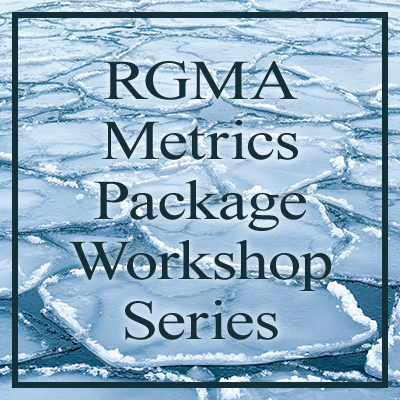RGMA Metrics Packages Tutorial Series
The overarching goal of the Regional and Global Model Analysis (RGMA) program area within the U.S Department of Energy's (DOE) Earth and Environmental Systems Modeling Program, is to quantify and enhance a predictive, process-level, and decision-relevant understanding of variability and change in the Earth system by advancing capabilities to design, simulate, evaluate, diagnose, and analyze global and regional earth system models informed by observations.
To address this goal, RGMA-funded scientists have been developing several metrics packages, and while some of these packages may already have a significant user base, it is likely that many RGMA scientists are not familiar with these tools. An immersive opportunity to learn how to use these tools, and possibly to contribute metrics, will be helpful for their research and their projects. At the same time, such an opportunity will help package developers to expand their user base, refine their tutorial materials, and expand the scope of their packages.
An RGMA Metrics Package Workshop Series will feature a different metrics package. Each tutorial will be spread over two days and will include one or more of the following components:
- A demonstration of a capability as part of the RGMA series, which would be open to the public, recorded, and made available through the RGMA YouTube channel.
- A hands-on tutorial that would be accessible to RGMA scientists only, and during which participants will work through a few prepared example problems.
- An opportunity for participants to work with package developers on contributing new metrics.
The primary analysis platform will be the NERSC facility, where a ‘data lake’ consisting of CMIP6 output and other data sources (e.g., reanalysis data) has been assembled, and where most packages are available within the E3SM-Unified environment.
Register for the tutorial session(s) of your choice here.
2024–2025 Schedule
Dates to be announced
International Land Model Benchmarking (ILAMB)
POC: Nate Collier and Forrest Hoffman
Repository: https://github.com/rubisco-sfa/ILAMB
Reference: https://doi.org/10.1029/2018MS001354
Summary: The International Land Model Benchmarking (ILAMB) project is a model-data intercomparison and integration project designed to improve the performance of land models and, in parallel, improve the design of new measurement campaigns to reduce uncertainties associated with key land surface processes.
PCMDI Metrics Package (PMP)
POC: Jiwoo Lee
Repository: https://github.com/PCMDI/pcmdi_metrics
Reference: https://doi.org/10.1029/2007JD008972
Summary: PMP provides a diverse suite of relatively robust high level summary statistics across space and time scales, gauging the differences between models and observations.
TempestExtremes (TE)
POC: Paul Ullrich
Repository: https://github.com/ClimateGlobalChange/tempestextremes
Reference: https://doi.org/10.5194/gmd-14-5023-2021
Summary: TempestExtremes (TE) is a multifaceted framework for feature detection, tracking, and scientific analysis of regional or global Earth system datasets on either rectilinear or unstructured/native grids.
The Toolkit for Extreme Climate Analysis (TECA)
POC: Travis O'Brien
Repository: https://github.com/LBL-EESA/TECA
Reference: https://doi.org/10.1016/j.procs.2012.04.093
Summary: TheToolkit for Extreme Climate Analysis (TECA) contains a collection of climate analysis algorithms targeted at extreme event detection and analysis.
Xarray Climate Data Analysis Tools (xCDAT)
POC: Tom Vo and Stephen Po-Chedley
Repository: https://github.com/XCDAT/xcdat
Reference: https://xcdat.readthedocs.io/en/stable/
Summary: xCDAT is an extension of xarray for climate data analysis on structured grids. It serves as a modern successor to the Community Data Analysis Tools (CDAT) library.
Drought Metrics
POC: Zeyu Xue
Repository: https://github.com/cmecmetrics/Drought_Metrics
Reference: https://doi.org/10.1175/JHM-D-20-0314.1
Summary: The Drought Metrics package includes a complete suite of metrics for characterizing regional drought. It also narrows down a subset of the most important metrics that characterize drought in that area.
Cyclone Metrics Package (CyMeP)
POC: Colin Zarzycki
Repository: https://github.com/zarzycki/cymep
Reference: https://doi.org/10.1175/JAMC-D-20-0149.1
Summary: Cyclone Metrics Package (CyMeP) offers a suite of metrics for analyzing tropical cyclone trajectories on global or regional scales. This package includes a "scorecard" presentation for easy metrics comparisons along with maps of spatial quantities like storm genesis and track bias.
climextRemes
POC: Chris Paciorek
Repository: https://cran.r-project.org/web/packages/climextRemes/index.html
Reference: Paciorek, Stone, and Wehner (2018) doi:10.1016/j.wace.2018.01.002
Summary: Functions for fitting GEV and POT (via point process fitting) models for extremes in climate data, providing return values, return probabilities, and return periods for stationary and nonstationary models. Also provides differences in return values and differences in log return probabilities for contrasts of covariate values. Functions for estimating risk ratios for event attribution analyses, including uncertainty. Under the hood, many of the functions use functions from 'extRemes', including for fitting the statistical models.
Meridional ovErTurning ciRculation diagnostIC (METRIC)
POC: Fred Castruccio and Gokhan Danabasoglu
Repository: https://zenodo.org/record/4708277
Reference: https://doi.org/10.1029/2021GL093045
Summary: The Meridional Overturning Circulation Diagnostic (METRIC) python module enables consistent calculations of Atlantic meridional overturning circulation (AMOC) estimates at various observational arrays from ocean general circulation models. To make the most appropriate comparisons, the package evaluates the model meridional overturning circulation using analogous observation-style methods.
International Ocean Model Benchmarking (IOMB)
POC: Forrest Hoffman
Repository: https://github.com/rubisco-sfa/ILAMB
Reference: https://doi.org/10.1029/2022JC018965
Summary: The International Ocean Model Benchmarking (IOMB) package is used to evaluate marine biogeochemistry models through comparisons with observations. IOMB provides a variety of in-depth diagnostics of marine biogeochemical model variables on annual and inter-annual time scales.

